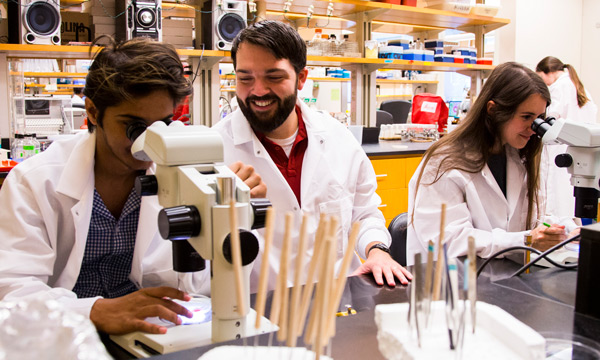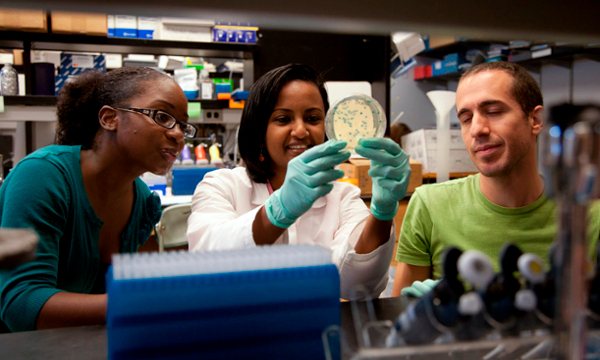Frequently Asked Questions
What are the general admissions requirements?
- A strong undergraduate background in the physical, biological, or behavioral sciences.
- A cumulative average of B+ or better in major science courses.
- High motivation for a career in biological or biomedical research.
- Strong letters of recommendation (three (3) are required).
- Prior research experience is highly valued.
- A thoughtfully written Statement of Purpose that includes information on why you want to attend graduate school, any research interests you may have, and details on any prior research experience, including the extent to which you were intellectually and independently involved in your research project.
- GRE scores are not required and there is no field to enter this information in the application.
- International applicants whose native language is not English must also complete the Test of English as a Foreign Language (TOEFL), or the International English Language Testing System (IELTS). For these exams, scores must be no more than two (2) years old from the date of the application.
What do admissions committees consider during the review process?
- Admissions committees consider prior research experience to be the most important factor in the application review process, followed in order by letters of recommendation from research mentors, transcripts and GPA, other relevant letters of recommendation if any, and honors and/or leadership positions.
What are the admissions statistics?
- Around 12% of the applicant pool is offered admission and approximately 40-50% enroll. (The Graduate Division typically enrolls about 70 students each year.)
How long does it take to complete the program?
- It takes approximately 6 years to complete the PhD, but the time to degree can vary among the different programs. The Laney Graduate School lists program statistics for each of their programs. The Graduate Division of Biological and Biomedical Sciences and our eight programs are listed individually.
What is the average GPA for a Biological and Biomedical Science applicant?
- Students offered admission typically have cumulative GPAs that range from around 3.0 to 4.0, and the average GPA for the incoming class is historically around 3.5.
Do you enroll for the MS degree?
- All GDBBS programs lead to the PhD degree. There are no master's degree programs offered by the GDBBS.
When are interviews held?
- Program interviews are usually held in late January through late February by invitation of the Program to which the student has applied. Interview travel expenses are paid by the Division for domestic applicants. Please see Section 9 - International Students for how international interviews are handled.
How does the interview process work?
- All of our programs invite students to campus and pay the expenses if the applicant is invited to interview. We do not pay for applicants to visit outside of the interview process. If you will be in the Atlanta area and would like to visit on your own we can try to customize a visit for you, but we would need at least 2 weeks' notice, along with a list of who you would like to meet. Faculty are generally not available during the busy admissions season, which is typically from December through February.
Can you review my material before I submit my application?
- Our office does not evaluate material for prospective applicants. Each program has an admissions committee that will review the applications that are submitted to their program.
Do I need to have received an MS degree prior to applying?
- The minimum requirement to enroll is receipt of a bachelor's degree.
Can I start in the spring?
- No, all students start in the fall semester.
Do I need to contact professors before I apply?
- You do not need to contact faculty since all students perform three rotations prior to affiliating with a faculty member. You do not need to know whom you want to work with prior to applying, but if you are interested in certain professors you can list that information in your statement of purpose.
Are applicants required to have previous research experience?
- Research experience is highly desired by the admissions committees. Research experiences can vary greatly by applicant and could range from summer experiences, to work done at your degree institution, to work performed as an employee after graduation. Research, where you are more intellectually and independently involved, are stronger experiences.
What level of financial support do you provide?
- All students who are accepted and enroll receive a competitive stipend, tuition scholarship, and health insurance. For the 2025-2026 academic year the stipend for students in GDBBS programs is $42,000.
Are teaching or laboratory assistantships required for receipt of financial aid?
- No, however, all students are required to serve as a teaching assistant for one semester, usually during their second year. This is an educational requirement of the Laney Graduate School. The primary purpose of the teaching experience is to aid students in strengthening their organization and communication skills.
What happens if I receive an external fellowship?
- Students who apply for and are awarded an external fellowship that provides at least 75% of their stipend will receive a $2,000 supplement to their stipend for the length of the award.
How does the cost of living compare at Emory?
- The cost of living in suburban Atlanta compares very favorably to other university cities, and only in rare instances is the cost of living in the Emory area higher than that of comparable universities.
Is this an umbrella program?
- All of our graduate programs are interdepartmental and are centered on broad approaches to modern biological sciences. GDBBS is not departmental based and not an umbrella program. Applicants apply to and are accepted by a specific program that fits their broad interests. Students work with faculty from many different departments, which provides a truly interdisciplinary training experience. Most students graduate from the program to which they are admitted, but for those whose research interests change, the GDBBS provides the flexibility by allowing the student to change programs after the first year, or work with another GDBBS faculty member in a different program. This provides the flexibility of an umbrella program while giving the student better mentoring of program-based admissions.
Can I apply to more than one program?
- You may apply to more than one program by submitting complete applications for each program, including letters of recommendation.
Can I transfer credits from another program?
- Transfer of Ph.D. credits is entirely up to the program to which you are admitted and typically occurs around the time of matriculation. The program will review your transcript and if there are any courses that are similar to any of the courses in the curriculum, then they may consider transferring those credits if you are accepted into the program.
When is the application available?
- Our online application should be available by early September each year. The deadline date for submission is 11:59 p.m. Pacific Standard Time on December 1st.
Do you offer application fee waivers?
- The Laney Graduate School offers two general types of fee waivers: 1) based on participation in certain graduate study preparation programs, and 2) for financial need. Information can be found at on the Admissions Application page under the "Application Fee" section.
What do admissions committees consider during the review process?
- Admissions committees consider prior research experience to be the most important factor in the application review process, followed in order by letters of recommendation from research mentors, transcripts and GPA, other relevant letters of recommendation if any, and honors and/or leadership positions.
- The Statement of Purpose provides an opportunity for you to convey to the admissions committee how your academic and research experiences have motivated and prepared you for doctoral studies in the biosciences. You should express why you have chosen your particular field of interest, discuss your tentative plans for graduate research, as well as your proposed career plans. Describe your involvement in relevant advanced courses and research projects, and describe the extent to which you were intellectually and independently involved in your research. It is helpful to include a resume and cite any publications that resulted in whole or in part by your work. Keep in mind that this is not a test of your creative writing skills. Statements should contain substantive, applicable information that will assist the admissions committee in determining whether or not you are well-suited for doctoral study. Committees will be searching for students who demonstrate a firm commitment to research and who express a genuine interest in the proposed field of scientific study. There are no word or page limits, however, we recommend that the statement of purpose be no longer than two pages double-spaced. This is only a recommendation, and your statement of purpose can be longer, if needed.
How many letters of recommendation are required?
- Three letters of recommendation are required for your application to be complete. There is space on the application to enter an optional fourth letter.
When are letters of recommendation due?
- Letters of recommendation are a very important part of your application. It is highly recommended that you complete this section of the application as early as possible so that you can give your letter writers as much time as possible to complete and submit their letter of recommendation. If you wait to complete this section until shortly before you submit your application the admissions committee may not receive the letters of recommendation in time to consider them during their review process, which would place your application at a disadvantage. The deadline to receive the letters of recommendation is December 1.
GRE scores are not required, but can I still submit GRE scores with my application?
- GRE scores are not required by any of the Programs in the Graduate Division of Biological and Biomedical Sciences, and, therefore, will not be considered during the admissions process.
Can application material arrive after the deadline date?
- All material is supposed to arrive by the December 1 deadline date. We will continue to accept application material after the deadline date, however, after December 1 the programs will be actively reviewing applications and making decisions and the later support material arrives the more of a negative impact it will have on your application.
Can I send material by mail?
- We specifically ask that applicants not send us any material in the mail. The rare exception can be made for letters of recommendation, but only when the letter writer cannot use the online system to submit the letter or the applicant is sending letters by mail using Interfolio. There is a processing delay when letters are received outside of the online system.
Who do I contact if I need help with the application?
- If you need additional assistance, please email lgsadmissions@emory.edu.
How many letters of recommendation are required?
- Three letters of recommendation are required for your application to be complete. There is space on the application to enter an optional fourth letter.
Can I submit a paper letter of recommendation?
- Unless the faculty member is unable to use a computer to complete the recommendation process we strongly recommend asking them to use the online recommendation system. The online application is set up so that all of the material can be submitted online. The online system is set up in such a way that the processing of the paper recommendation letter will cause a delay in the processing of your application, as it will have to be handled as a separate form rather than as part of the whole application (any online recommendations received are automatically bundled with the rest of your application file).
How can I send a reminder to a recommender?
- Using the online system, applicants can send an email to their recommenders, delete a recommender and add a different one, or add a fourth recommender. We must receive three letters of recommendation for your application to be complete.
How do I submit a letter of recommendation using Interfolio?
- In some cases Interfolio has uploaded the recommendations, and in such cases they provided the applicant with the email address that they should use in the application. If Interfolio does not provide an email address, then you can send the letters to Kathy Smith at kathy.smith@emory.edu or by mail.
How do I enter my GPA?
- The application asks for you to enter your GPA and GPA scale. There is no need to translate your GPA to a 4.0 scale. If your school does not provide a GPA, as is the case in a few schools, enter a GPA of 0.0 and a scale of 0.0, and this will let us know that your school does not assign GPAs.
How should I provide my unofficial transcripts for the application?
- The preferred method is for you to get an official copy of your transcript from the Registrar's office, scan it as a single PDF, then upload it to your application. However, if the unofficial transcript that you can print from your school's student information system is organized and easy to read then it will be acceptable to use the copy printed from the web. In our experience, some of the copies printed from student web interfaces are very difficult to read, and hence we prefer copies from the Registrar's office.
I uploaded my transcripts to my application. Do I need to send official transcripts as well?
- The admissions committee uses the unofficial transcripts that applicants upload as part of their application during their review process. Only students who are accepted and enroll need to provide official degree granting transcripts, and we specifically ask that applicants not send us material in the mail.
Are there special instructions for submitting international transcripts?
- Degrees and transcripts from international institutions often differ from those in the United States. We recommend that applicants with degrees from international universities submit a course-by-course educational credential evaluation of each international transcript so that the Emory admissions committee will fully understand your educational background and academic preparation.
- Course-by-course evaluations help the faculty who review applications compare the education at an international institution to a similar education at a U.S. university. Among other things, evaluations show course titles along with grades and credit hours translated into U.S. equivalents. Since university credit and grading systems vary a great deal across the world, these documents help ensure that international credentials are assessed appropriately.
- We do not require that you submit credential evaluations. Your application will be considered complete as long as it contains transcripts, with translations as needed.
- If you decide to submit a credential evaluation, please keep the following in mind:
- The process of requesting and receiving credential evaluations adds time to your application preparation. Be sure to start early, so all your materials will arrive with your application by the application deadline.
- We accept credential evaluations from Educational Credential Evaluators, Educational Perspectives, and World Education Services.
- Reports from Educational Perspectives can be requested and attached to your application in our application form, through a service called CertiFile. If you choose to do this, the application will guide you through the steps the process is explained in the Education section of our application if you enter information for an international institution. Note that an evaluation you request through our application will be yours to use for other applications as well.
- Reports from Educational Credential Evaluations or World Education Services can be attached to your application through the transcript upload field associated with the educational institution you enter information about. If you upload the credential evaluation(s) yourself, remember to include with the evaluation report the transcript that was evaluated, along with the translation if appropriate, all in one file.
How do I upload transcripts that are more than one page?
- Transcripts need to be uploaded as one complete file, so applicants will need to combine all of the pages into one file before uploading.
Do I need to provide transcripts for all of the schools I attended?
- If you attended a school and had your course(s) transferred to your degree institution and that transcript lists the course, grade, and credit hours you do not need to submit a separate transcript. If you list that school as a separate entry the application system will require that you upload a transcript.
Can I submit updated versions of application material (e.g., CV, statement of purpose, transcripts)?
- We are unable to respond to students requests to upload different material to their application. Our office does not remove or add any document to your application once it has been submitted, so please take care to upload the correct documents before you submit your application.
Is there a section where I can see what is missing in my application?
- The online application is set up so that all required material must be completed/uploaded before the applicant can submit the application. The two exceptions are the official scores (the admissions committee will start the review process with your unofficial scores) and the letters of recommendation (which you can track in the activity center in CollegeNET).
How do I find out the status of my application?
- Once the program has made a final decision on your application you will be notified. We do not post decisions online, and each applicant will receive an email with the final status of their application once that decision has been made. All decisions are finalized by April 15th.
How do I find out if all of the interview invitations have been extended?
- The programs handle their own review process. The admissions committee starts reviewing applications shortly after the December 1 deadline date and then start to extend interview invitations. Each program will also typically maintain a healthy waitlist and programs will sometimes extend additional interview invitations later in the process. Each applicant will receive an email with the final decision that was made on their application, and until you receive that email your application is still under consideration.
Are international students with a bachelor's degree eligible to apply for this program?
- All applicants who are offered admission and enroll must have received a minimum of a bachelor's degree prior to matriculation in one of our PhD Programs.
Do international students who are admitted to the program receive the same financial support as U.S. citizens?
- We provide financial support, including a tuition scholarship, health insurance and stipend ($38,404 for the 2024-2025 academic year) to all students who accept our offer of admission and enroll.
Do you offer application fee waivers for international applicants?
- The Laney Graduate School offers fee waivers based on financial need. Information can be found on the Admissions-Application page under the "Application Fee Waivers" section.
How many international students apply and are accepted?
- In a typical admissions cycle about 35% of the applications are from international students. Around 11% of the entering class is international.
Can the TOEFL requirement be waived?
The TOEFL exam is waived if the applicant will receive a BS or MS degree from an institution where English is the language of instruction. There is a slight distinction:
- If you will be receiving your BS or MS degree from a US institution (or another English-speaking country), then the TOEFL is automatically waived and no documentation is required.
- If you received your education outside of the US but from an institution where English is the language of instruction, we will waive the TOEFL requirement. In such cases, the applicant has to send Kathy Smith (Kathy.Smith@emory.edu) an email stating that their school's language of instruction is English.
NOTE: The IELTS can substitute for the TOEFL exam.
How are interviews usually organized for international students?
- This varies by program and can typically be handled 1) via Skype; 2) the program may pay a portion of the applicant's international airfare to Atlanta; or 3) the program may pay the applicant's airfare from a location in the United States to Atlanta (and the applicant pays the costs to the United States).
Is there a minimum score for the TOEFL exam?
- We have no set minimums and the admissions committee considers all aspects of application when making their decision. The recommended score is 100, and admitted applicants usually have a wide range of scores.
Are there special instructions for submitting international transcripts?
- Degrees and transcripts from international institutions often differ from those in the United States. We recommend that applicants with degrees from international universities submit a course-by-course educational credential evaluation of each international transcript so that the Emory admissions committee will fully understand your educational background and academic preparation.
- Course-by-course evaluations help the faculty who review applications compare the education at an international institution to a similar education at a U.S. university. Among other things, evaluations show course titles along with grades and credit hours translated into U.S. equivalents. Since university credit and grading systems vary a great deal across the world, these documents help ensure that international credentials are assessed appropriately.
- We do not require that you submit credential evaluations. Your application will be considered complete as long as it contains transcripts, with translations as needed.
- If you decide to submit a credential evaluation, please keep the following in mind:
- The process of requesting and receiving credential evaluations adds time to your application preparation. Be sure to start early, so all your materials will arrive with your application by the application deadline.
- We accept credential evaluations from any evaluator affiliated with NACES, The National Association of Credential Evaluation Services. The most common ones are World Education Services, Educational Credential Evaluators, and Educational Perspectives.
- Reports from Educational Perspectives can be requested and attached to your application in our application form, through a service called CertiFile. If you choose to do this, the application will guide you through the steps the process is explained in the Education section of our application if you enter information for an international institution. Note that an evaluation you request through our application will be yours to use for other applications as well.
- Reports from Educational Credential Evaluations or World Education Services can be attached to your application through the transcript upload field associated with the educational institution you enter information about. If you upload the credential evaluation(s) yourself, remember to include with the evaluation report the transcript that was evaluated, along with the translation if appropriate, all in one file.





